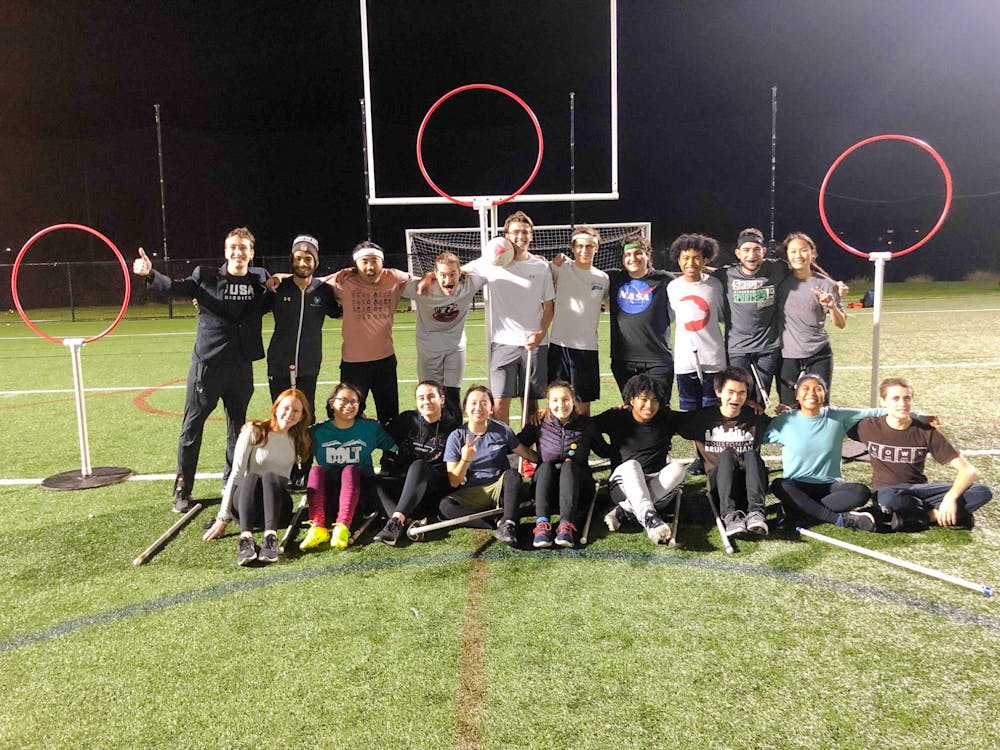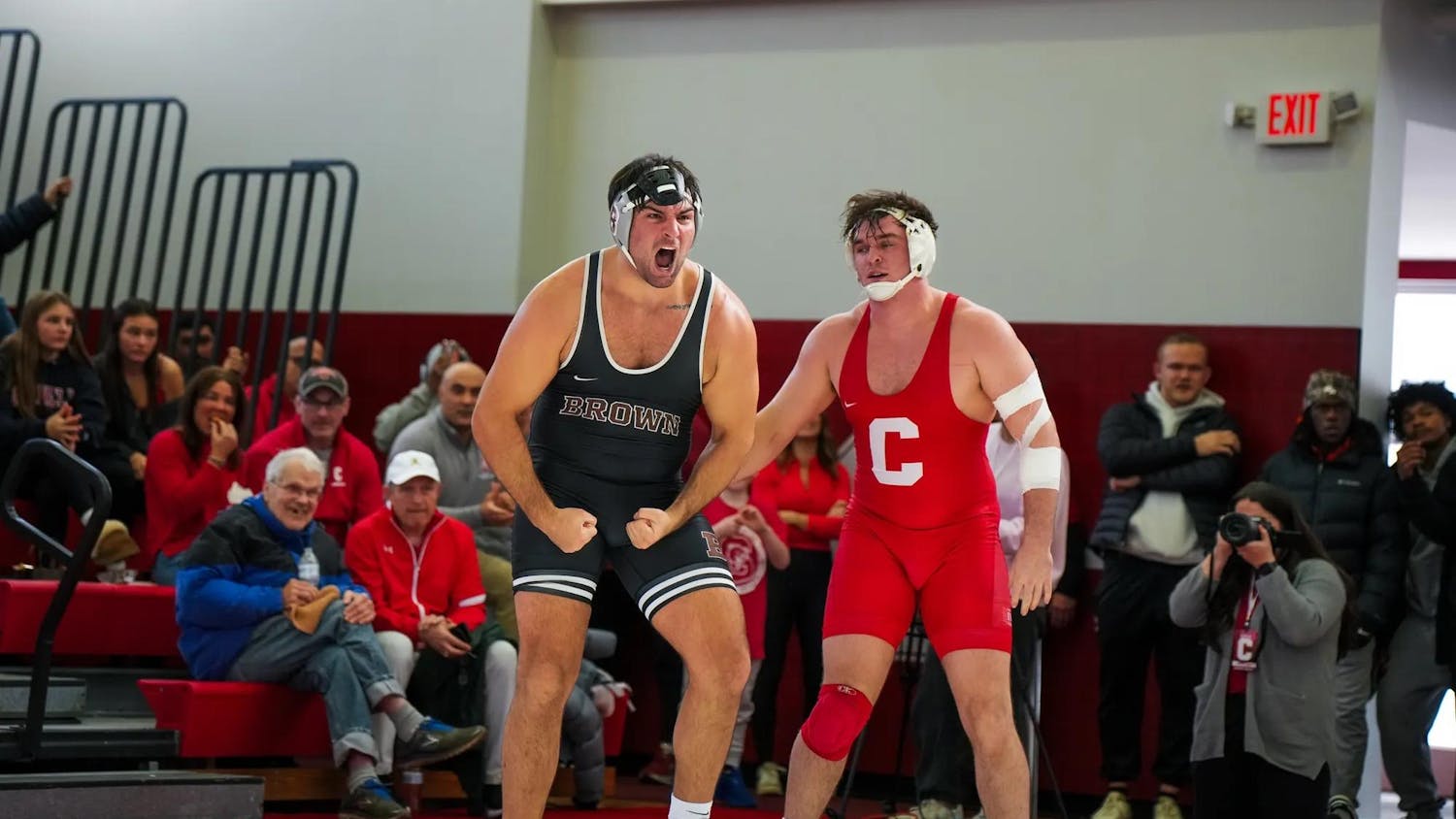As if by a levitation spell, the Brown club quidditch team soared across college leaderboards in its first season of competition, earning promotion to division one and finishing in the top 20 at the U.S. Quidditch Cup in Salt Lake City this past weekend.
“We proved that we belonged with the titans of our division and our region,” said Andrew Steinberg ’22, a chaser for the team. From “where we were to where we are, it really is a rags to riches Cinderella story. I think that across the country teams were rooting for us and we made them very proud.”
The Bears began the year as a division two team before being promoted, only losing one game all season to division one team Harvard, whom they later defeated. Last weekend at the national competition, the Bears won two games against Emerson College and the University of Illinois to advance out of their pool and enter bracket play, where they were eliminated in their first game by the University of Michigan. The Bears’ stellar play earned them a promotion to division one of the Massachusetts Quidditch Conference.
“I don’t know of any team past the first couple of years when Quidditch was a sport that has, as a brand new team, placed this well within college Quidditch,” said team member Bradley Smith ’23.
Members of the team cited diligent preparation and practice as reasons for their quick success.
“We’re not the largest players on the field, we may not have the most strength or speed, but we’re focused (and) we go into our games with a plan,” Smith said.
Part of that plan involves watching “hours and hours of tape,” Smith added. “The Friday before every game, we’ll get together as a team and we’ll have a film session. We’ll spend an hour and a half going over who are the players on (the opposing) team that we’re looking out for.”
In addition to the team’s hard work, teammates also highlighted the contributions of one “star player” in particular: Steinberg, whose resume includes playing with the Boston Forge, a Major League Quidditch team, as well as being one of nine college players selected for the U.S. National Team Development Academy.
“He was a huge asset” to the team this season, Smith said. “And he's worked really hard to distribute his skills and teach other people about how to improve their gameplay.”
“Towards the beginning of the year, … he was the one who did a lot of, at least in the chaser game, the movemaking,” said Ryan Silverman ’23. Now, “every single person is a vital part of the team. We’re passing a ton more than we ever used to (and) everyone’s scoring … versus just Steinberg. It’s been really nice to see that development.”
Though the sport is often not taken seriously due to its roots in a fictional sport of the Harry Potter universe, Quidditch “requires the toughness of rugby, the skill of basketball and the intellect of chess,” Steinberg said. Now, “the sport has changed: Quidditch has over 40 teams across the country, there’s a U.S. national team (and) there’s a world cup with nearly 30 countries. We have the receipts. … This is a real sport.”
“I was a varsity athlete in high school. I played track, I played basketball, soccer (and) I wrestled,” he added. “And this is the sport that puts it all together.”
In response to those who disregard the sport because players must stay “on-broom” with a pipe between their legs at all times, Steinberg asked, “Why in basketball do you have to dribble? … It’s a challenge. Running on a broom and catching on a broom and throwing on a broom takes athleticism, it takes skill (and) it takes coordination.”
While Steinberg was a seasoned athlete prior to becoming involved with Quidditch, some players with no experience in competitive sports become involved due to their love of the Harry Potter franchise. Others, such as Silverman, join as a way to get exercise. But ultimately, all end up fitting together to form a community uniquely situated between athletics and fandom.
This dynamic is captured by the phrase “Quidditch turns jocks into nerds and nerds into jocks,” a motto which Silverman, Smith and Steinberg all recited.
“Some people will come in because they played another sport and want to try a new sport,” Silverman explained, “while other people will come in because they are a fan of Harry Potter and want to try it out or just be part of a nerdy community.”
Just as the team works to accommodate players from all sorts of athletic backgrounds, gender equity and inclusion has become an essential pillar of the Quidditch community not just at Brown, but on a national level, with many teams aiming to create a safe space for non-binary and transgender athletes, Silverman said.
As opposed to other sports where strict gender divisions create debate surrounding non-cisgender athletes, inclusivity is integrated into the structure of Quidditch. This is due to a rule referentially dubbed “Title IX and 3/4,” which states that “you can’t have more than four players with the same gender identity on the pitch at a time,” according to Silverman.
“This is a sport that shows me that we can all be on the same field together, and we can all thrive in spite of what some reactionary politicians would say across the country,” Steinberg said.
The importance of gender inclusivity in the development of Quidditch’s growing culture puts the sport in a unique position in the face of Harry Potter author J.K. Rowling’s recent Twitter threads expressing sentiments which run counter to the mission of the sport, Silverman said. According to Silverman, as a result of Rowling’s views and copyright concerns with Warner Brothers, USQ and MLQ, the two major U.S. Quidditch organizations, will be changing their names next year.
“I joined the sport not out of a love of Harry Potter. What (is valuable) to me is the sport. I have fun playing it. I love the people. I love that I can be part of something that is affirming to people,” Steinberg said. “I would rather have that than be tied to something that is actively undermining that mission.”
“We will lose a little of that whimsy, which is unfortunate,” he added. “But I think in the long run for what we’re trying to do, it is important.”

Linus is a Sports editor from New York City. He is a junior concentrating in English, and when he's out of The Herald office you can find him rooting for the Mets, watching Star Wars or listening to The Beach Boys.





